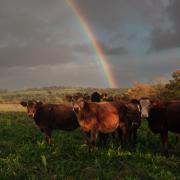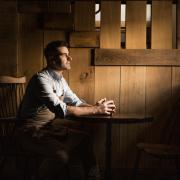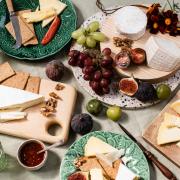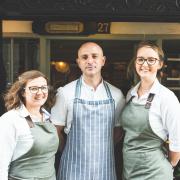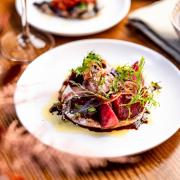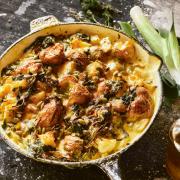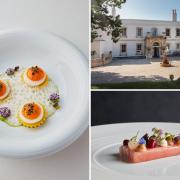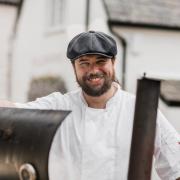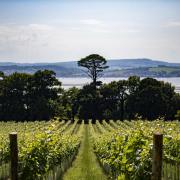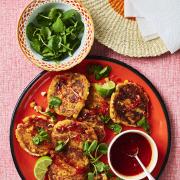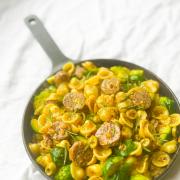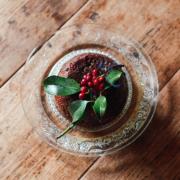Milking sheep, employing great-granny's recipes, making a racket around the apple trees and using every part of the pig except the oink have proved winning ways for these North Devon food producers.
'Tell me what you eat, I'll tell you what you are' used to be the saying, but maybe now it's time to upgrade it. The North Devon economy is one finely balanced between farming and tourism, and at the very heart of each is food and drink. The role of the producer, whether it's a thousand-acre farm or a four-acre smallholding, is crucial. 'Locally produced' is the stamp of excellence, and one the producers are rightly proud of. Yet it's still not enough. With food education and awareness ever increasing, the expectation of quality grows. People want to be wowed. So in North Devon, we get inventive.
Talk is sheep
From architects to sheep milking, Lawrence and Karen Wright's jump into food production may seem enormous, but to them it was just a natural progression. "The first time I holidayed right here on Middle Campscott Farm, I was just three years old," Lawrence told me.
Several years and a successful career later, the opportunity to buy the house and 20 acres came up. "It even came complete with a couple of pet pigs. The first thing I did was set up the milking parlour and dairy. The local farmers thought we were crazy even to think of milking sheep, and many of them still do - right up to the point when they taste the cheese. Then they understand."
Registered organic, their cheeses, from mild to strong, are all hand-set and finished. "We mainly sell them through all the local farmers' markets," Karen said, sharing a particularly creamy piece around. "We always have tasters, and encourage people to try before they buy. I just love it when someone tries it for the first time. The surprise and pleasure on their face makes it all worthwhile."
In addition to cheese, Lawrence and Karen also produce wool and woollen products and can even knit to order.
For more information, visit www.middlecampscott.co.uk.
Cider - the elixir of life?
Aged just seventeen, Peter Hartnoll spent ten-and-a-half weeks in a coma following a car accident. Armed with nothing more than a disability, a smile, a quick wit and a determination to make a success, he found his career path zigzagged all the way to Ostlers Cider Mill.
Set in four acres, the mill has some 12,000 apple trees. "I have lots of help from people locally, and families of pickers, who collect up to 100 tonnes of Westcountry apples each year."
The healing properties of cider vinegar go back to biblical times, and evidence was even found within the Roman remains at Bath. So what's the secret? "Ah," Peter jokes, "the magic comes in two shapes: one, a recipe that has been handed down through the same family since 1530, and two, wassailing."
Traditionally on Twelfth Night, the ancient ritual of wassailing is performed amongst the apple trees to increase fertility. Wassail songs are sung, and bread placed in the boughs of the oldest tree before cider is poured down amongst its roots, while a shotgun is fired into the air and the crowds, laced with cider themselves, make as much noise as possible, all to ward off any evil spirits.
Peter's cider, cider vinegar and apple blossom honey are available in local outlets in and around Goodleigh, and online at www.ostlerscidermill.co.uk.
A rosy-eyed view
When Rose Parkin received the devastating news that she was to be made redundant, it was her great-grandmother who came to the rescue. Rose's great-grandmother was a whiz with chutneys, jams and pickles, and sold them at the pannier markets in both Barnstaple and South Molton. Having sorted through and found all the old recipes, redundancy became the catalyst Rose needed to follow in her footsteps.
Now selling in the same markets in which her great-grandmother sold, and using her recipes, together with locally sourced ingredients, Rose's chutneys and jams are in great demand and there are shops throughout the area now stocking her goodies.
Lizzy's Larder, bringing the community together
Lizzy Kirby, together with her husband, Mike, and their three children, opened the current Lizzy's Larder just 18 months ago. "To me, a farm shop should be on a working farm, and reflect everything that's home produced and local," Lizzy said. The shop, set amongst the lush green fields of a 120-acre farm just north of Holsworthy, home to 400 ewes, 20 award-winning cattle and dozens of happy chickens scratching and clucking away, offers a fantastic collection of food and crafts.
"I guess we have about 15 local people who contribute towards the shop," she said, taking delivery of a tray of fresh eggs from a family who dropped by. "They bring in everything from vegetables, paintings, basket weaving, fudge and chutneys, right down to a lady who bakes two or three sponge cakes a week." Because of this, the shop has a lovely feel to it, as though all the imagination, care, time and trouble of a whole area is condensed into one place.
What still surprises me," Lizzy confessed, "is that my initial idea behind the farm shop - that all the produce should have full traceability and that it should all be traced back to local suppliers - should be shared by so many other people."
Open every day except Mondays, Lizzy's Larder makes a delicious trip out to sample home cooking, local produce and crafts, enjoy a cream tea while you browse or just come and meet the many friendly animals. Lizzy's Larder can also be seen at www.lizzyslarder.co.uk.
Standing out in the Hidden Valley
A smallholding of just 20 acres on Exmoor, Hidden Valley Farm is run by Debbie and Simon Dawson. Debbie is a solicitor from London who turned her back on a glittering career in order to follow her dream. "To some extent I think my background has helped me," she laughed. "Fourteen years of practice certainly gave me a streetwise knowledge of people and people skills, which, believe it or not, does help when you're dealing with groups of rowdy pigs, running together like little racehorses in the woods."
Winning second place for the South-west in Gary Rhodes' search for a Local Food Hero in 2007, and appearing on BBC1's Countryfile last month, has only seemed to underpin the interest the smallholding has generated.
"Our meat is very different. Everything on the farm - the Berkshire pigs, the rare breed chickens - range more widely, for longer and to a greater age than most, giving the end product a greater depth of flavour and a taste our great-grandfathers would recognise."
Using every part of the pig except the oink is an important part of Debbie's philosophy. "A lot of cuts have gone out of fashion," she said, "such as the trotters and hocks, brawn and homemade faggots. But when people see them presented nicely on our market stall, they're always the first things to go."
Innovative sausage flavours, such as Madras and West Country Blue Cheese, also helps keep their product list fresh and their customers hungry for more. Find out more at www.hiddenvalleypigs.co.uk.
'Tell me what you eat, I'll tell you where you are' could so easily be true of North Devon. With one eye on tradition and the past, and one seeking out new and fresh ideas, North Devon food producers are set to continue wowing new and established customers in a big way.
MATT JACKSON



